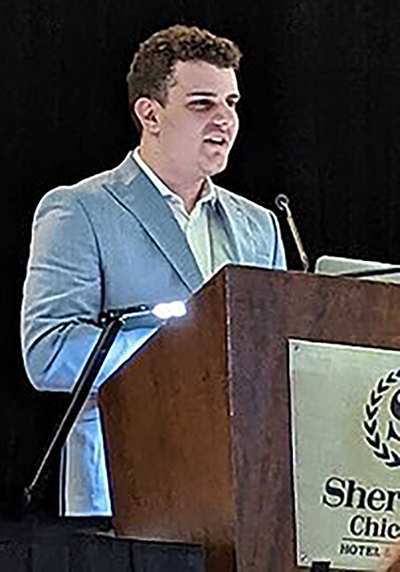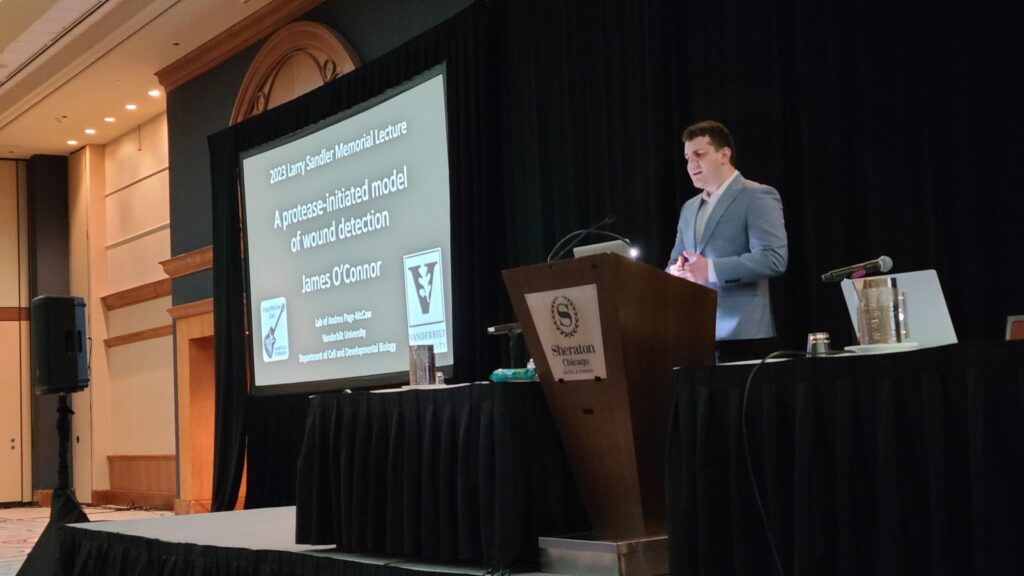By Lorena Infante Lara

The Genetics Society of America has presented James O’Connor, a Ph.D. graduate from the Department of Cell and Developmental Biology, the 2023 Larry Sandler Award. This international award recognizes the best Ph.D. dissertation on Drosophila—a fly genus that includes the fruit fly, a widely used model organism in biomedical research—from the previous year.
O’Connor, who did his graduate work in the lab of Andrea Page-McCaw, professor of cell and developmental biology, defended his dissertation in January 2022. His work focused on understanding how cells around a wound know that damage has occurred and how they respond properly. He used D. melanogaster flies—fruit flies—to monitor wound and injury response, which he says are remarkably similar to those of humans. The work was performed in collaboration with colleagues in the Page-McCaw lab and the Shane Hutson lab. Hutson is the chair of the Department of Physics and Astronomy at Vanderbilt.
“I traced the cellular injury response all the way back to the destruction of cells at the very beginning of an injury,” O’Connor said. He found that proteases, enzymes that cleave other proteins, are released from dying cells and activate cytokines, which signal about the wound to faraway cells.
O’Connor’s work determined basic biological principles of how cells communicate information and change their behaviors in response, which could help scientists figure out ways to speed up would healing or get the repair process restarted for regeneration, which is otherwise limited in humans. His work could also have implications for cancers, as the cellular processes driving migration and proliferation become dysregulated.
For his efforts, O’Connor’s dissertation was recognized as “a masterful body of work studying a critical cell biological question regarding wound signaling” by Tim Mosca, an assistant professor of neuroscience at Thomas Jefferson University and the chair of the awards selection committee for this year’s Drosophila Research Conference.

The award, which memorializes Larry Sandler, a geneticist primarily known for his work on a phenomenon called meiotic drive and for his role in establishing the DRC in the 1950s, was first presented in 1988, a year after Sandler met an untimely death. The award serves “to honor [Sandler] for his many contributions to Drosophila genetics and his exceptional dedication to the training of Drosophila biologists,” according to the DRC website.
Each year, the recipient of the Larry Sandler Award presents the Larry Sandler Memorial Lecture, a plenary talk that kicks off the GSA-hosted conference. The DRC draws about 1,500 researchers annually, which this year included 2022 Vanderbilt Prize recipient Ruth Lehmann.
“Seeing James O’Connor deliver this year’s Larry Sandler Memorial Lecture at this year’s Drosophilameeting in Chicago was such a treat,” Lehmann said. “James provided genetic evidence supported by careful imaging studies showing how the release of proteases rather than the release of the signaling molecules themselves initiates wound repair.” Lehmann is the director of the Whitehead Institute, a professor of biology at the Massachusetts Institute of Technology, and a member of the National Academy of Sciences.
Three other finalists and a runner-up from institutions in Austria, the Netherlands, and the U.S. were recognized prior to O’Connor’s talk.
“I was incredibly proud to see James selected for the Sandler Award,” said Page-McCaw, his dissertation advisor. “It was a joy to work with him. He came to Vanderbilt with an interest in biophysics, and so working in a collaborative environment with biologists and physicists was perfect for him. I am so happy his work was recognized by the international Drosophila community, and I couldn’t be happier to see James thrive.”
O’Connor is now a postdoctoral fellow in the lab of Aaron DiAntonio at the Washington University in St. Louis, where he studies cell-cell communication between macrophages and injured or pathogenic neurons.